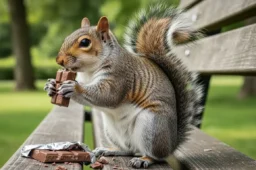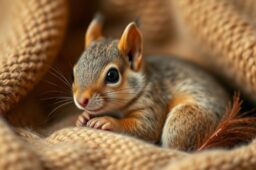Why Do Squirrels Eat Mice? The Shocking Truth About Their Omnivorous Diet
- November 01, 2025
- by
- John Miller
Squirrels have long been thought of as herbivores, primarily living off nuts, seeds, and fruits. But the truth is much more complex. While their diet largely consists of plant-based food, they are opportunistic omnivores, meaning they sometimes turn to meat to fulfill their dietary needs. This raises the intriguing question: Why do squirrels eat mice?
The Nut-Cracking Myth: Are Squirrels Actually Carnivorous?
Squirrels are commonly associated with nut-cracking and acorn-hoarding, but their eating habits aren’t strictly vegetarian.
Many people are surprised to learn that squirrels are opportunistic omnivores, not solely herbivores. This means that, while they may love nibbling on nuts, they aren’t averse to eating meat, including small animals like mice.
In times of food scarcity or high nutritional demand, squirrels may turn to hunting smaller creatures. This includes everything from insects to the occasional mouse. So, is it normal for squirrels to eat meat? Let’s delve deeper.
Reasons Why Squirrels Eat Mice: Uncovering the Primal Motivations
The Critical Quest for Protein: A Nutritional Necessity
Squirrels, like many other animals, need protein to stay healthy. While their primary food source is plant-based, protein is essential for growth, reproduction, and survival. When their usual food supply of nuts and seeds isn’t enough, squirrels will eat mice to fulfill their protein needs.
This is especially common in the colder months when plant-based foods become scarce. In these situations, a protein boost from small animals can be a vital survival strategy.
Opportunism in Lean Times: When Nuts and Seeds Aren’t Enough
Squirrels are smart creatures, and they know how to survive in various environments. In times of food scarcity, especially during the winter months or in urban settings where food sources are limited, squirrels may look for alternative meals.
This is where mice come into play. If a squirrel can’t find enough seeds or nuts, it might turn to hunting small animals like mice. It’s not out of hunger alone; it’s about seizing the opportunity for a quick, high-energy meal when the usual food sources aren’t available.
Eliminating the Competition: Territoriality and Resource Defense
Squirrels are highly territorial animals, and they’re known to protect their home ranges from intruders fiercely. While most of this behavior is directed at other squirrels, there’s an interesting twist.
If a mouse happens to wander into a squirrel’s territory, the squirrel might not just chase it away; it might kill it. This isn’t purely for food; it’s also about reducing competition.
By eliminating potential threats to their food source, squirrels ensure that they have the space and resources they need to survive, especially in crowded or resource-deprived environments.
Predator or Scavenger: Do Squirrels Actively Hunt Mice?
This is the section where we’ll dig into whether squirrels are true hunters or simply scavengers that take advantage of dead animals. Let’s explore the nature of squirrels when it comes to actively hunting mice.
The Surprising Predator: How a Squirrel Can Hunt and Kill a Mouse
While most people wouldn’t consider squirrels as hunters, the reality is that they can and do hunt small animals, including mice. Unlike the well-known predators of the wild, squirrels don’t actively hunt for meat as their primary food source. However, if they come across a vulnerable or injured mouse, they can seize the opportunity. Squirrels possess sharp claws and teeth, which help them capture and kill small creatures like mice. Their quick reflexes and adaptability make them surprisingly efficient predators in the right circumstances.
A Meal of Convenience: Do Squirrels Eat Dead Mice?
It’s not just live mice that are on the menu for squirrels. Like many opportunistic omnivores, squirrels will scavenge when the opportunity arises. If they come across a dead mouse, whether in the wild or in urban settings, they may consume it for the nutritional value.
This scavenging behavior is common in squirrels, especially when food is scarce. Dead mice provide a convenient and easy source of protein, and squirrels will waste no time in taking advantage of such opportunities.
How Often Do Squirrels Eat Mice? A Habit or a Rarity?
Now that we understand why squirrels might eat mice, it’s important to consider how often this behavior actually occurs. Is it something they do regularly, or is it a rare occurrence?
Is It Normal for Squirrels to Eat Mice?
While it’s not the primary food source for most squirrels, it’s not entirely unusual for them to eat mice. This behavior typically happens when the squirrels are in need of extra protein or when plant-based food sources are limited.
Squirrels do not have a habit of hunting mice daily. Still, in times of scarcity or when they find a particularly vulnerable prey, they will take advantage of the opportunity. So, while it’s not their go-to meal, it’s certainly a possibility when conditions are right.
Seasonal Spikes: When Are Squirrels Most Likely to Eat Meat?
Squirrels are known for hoarding nuts and seeds, but their diet may shift depending on the season. During colder months, when plant food is harder to find, squirrels may turn to small animals like mice to meet their dietary needs.
This seasonal spike in carnivorous behavior is usually driven by the need for high-energy food to survive the winter. So, while squirrels may not eat mice year-round, colder seasons see an uptick in this behavior.
Beyond the Mouse: What Other Small Animals Do Squirrels Eat?
While mice are often the focus, squirrels eat a variety of small animals when the need arises. Let’s explore the other creatures that fall victim to squirrels’ opportunistic feeding habits.
This predatory behavior is a primary source of conflict for many backyard birders. A squirrel that is bold enough to raid a nest for eggs will just as eagerly empty a feeding station, which is why knowing how to keep squirrels out of bird feeders is a constant challenge.
The Vulnerable Nest: Do Squirrels Eat Baby Mice and Birds?
Squirrels are not shy when it comes to taking advantage of baby animals. Baby mice, birds, and even their eggs are all fair game for a hungry squirrel. In fact, squirrels are known to raid nests and consume baby birds or even eggs when they can.
This behavior is especially noticeable in the spring when squirrels have increased nutritional needs and access to a variety of young, vulnerable animals. Squirrels’ omnivorous diet is not limited to small rodents; they will also eat baby animals when they can find them.
A List of a Squirrel’s Surprising Victims
Squirrels, with their opportunistic feeding habits, consume more than just nuts and seeds. They have been known to eat insects, small birds, and mammals. This flexibility in their diet allows them to adapt to different environments. Squirrels are opportunistic feeders, and when plant-based food is in short supply, they will eat a range of small animals to sustain themselves. Some of the surprising victims of squirrels’ diets include insects, small mammals, and even the occasional amphibian.
What Kind of Squirrels Eat Mice? (Focus: United States Species)
Now that we know squirrels can and do eat mice, it’s time to focus on the species that are most likely to engage in this behavior. Let’s take a look at the types of squirrels in the United States that may include mice in their diet.
The Versatile Eastern Gray Squirrel
The Eastern Gray Squirrel is one of the most common species of squirrels in North America. Known for its adaptability and resourcefulness, this squirrel can thrive in both urban and rural environments. Eastern Gray Squirrels are opportunistic feeders and, though their primary diet consists of nuts, seeds, and fruits, they are not above eating small animals, including mice, when the need arises.
These squirrels are especially likely to hunt mice during the colder months when food is scarce. Their ability to adjust their diet makes them more likely to hunt and scavenge for protein-rich food, including small mammals like mice.
The Eastern Gray Squirrel is the most common and adaptable species in the US, known for its varied diet. This species also includes the visually distinct melanistic (dark) phase. Our black squirrel identification guide can help you determine if the one in your yard is a common gray or its unique variant.
The Fierce American Red Squirrel
American Red Squirrels are smaller than their gray cousins, but they are no less fierce. These squirrels are highly territorial and are known for their aggressive behavior when it comes to defending their food sources.
While they primarily feed on seeds, nuts, and berries, American Red Squirrels are also known to hunt small animals like mice when the opportunity arises.
This species is more likely to hunt for small prey, including mice, because of its aggressive nature and territorial instincts. Their predatory behavior, though less common, is still an important part of their survival strategy.
The Earthen Ground Squirrel
Ground squirrels, particularly those found in the Western United States, have a slightly different lifestyle compared to tree squirrels. These squirrels are burrowers, and their diet can be more varied.
Ground squirrels are known to eat not only plant material but also small animals, including mice. Since they spend a significant amount of time on the ground, they are more likely to encounter small mammals and even insects, which they readily consume.
Their opportunistic feeding habits make them more inclined to eat mice when the chance arises, particularly in their underground burrows, where they scavenge for any available food.
A Backyard Battleground: Do Squirrels Eat Mice in the Garden?
Many homeowners have encountered squirrels in their gardens, but what happens when these creatures start eating mice in the backyard? Is this behavior something you should worry about?
While seeing a squirrel control your garden’s mouse population might seem beneficial, their presence is often a double-edged sword. These same opportunistic instincts are what drive them to dig up bulbs and steal produce, making how to keep squirrels out of a vegetable garden a top priority for homeowners.
Why Your Garden Might Be a Hunting Ground
If you’ve noticed squirrels in your garden, you might also see them hunting mice and other small creatures. Gardens offer a unique habitat for squirrels, filled with both plant-based food sources and the occasional mouse.
Squirrels are opportunistic, so if they come across a mouse or other small animal in your garden, they will likely take advantage of the easy meal. Mice, especially those that have set up nests in the area, become prime targets for hungry squirrels. So, while you might see squirrels as cute garden visitors, they can also become effective hunters when the situation calls for it.
Should You Be Worried? (The Ecosystem Role)
While seeing a squirrel hunt mice in your garden might seem unusual, it’s important to remember that squirrels play a role in the local ecosystem. As omnivores, they help control the population of small animals, including mice, which can sometimes become pests. However, it’s essential to keep an eye on your garden’s overall health.
If squirrels are eating mice, they may also be damaging your plants, digging up bulbs, or stealing produce. So while squirrels can help manage small rodents, their presence in your garden can be a double-edged sword.
If you’re looking for a safe and humane way to manage your squirrel problem, consider exploring effective squirrel trap options that ensure both your peace of mind and the well-being of the animals.
Understanding the Complete Squirrel, an Omnivore in Disguise
Squirrels are more than just cute, acorn-hoarding creatures we see in our yards and parks. They are complex omnivores, adapting their diet to the available resources.
While their primary food source is plants, they are perfectly capable of hunting and scavenging for small animals like mice. Whether it’s for protein, convenience, or territory defense, squirrels’ ability to eat mice is part of their survival strategy.
From the adaptable Eastern Gray Squirrel to the aggressive American Red Squirrel and the burrowing Ground Squirrel, each species brings its own twist to this omnivorous behavior. Their dietary flexibility ensures they can thrive in diverse environments, from urban gardens to wild forests.
Understanding why squirrels eat mice and other small animals sheds light on their fascinating and often misunderstood behavior. While it might seem shocking to think of squirrels as predators, it’s just another example of nature’s complex and remarkable survival tactics.
No, squirrels are omnivores, meaning they can eat both plants and small animals, including mice, when the opportunity arises.
Besides mice, squirrels may eat birds, eggs, insects, and other small mammals when they are in need of extra protein or during times of food scarcity.
Yes, squirrels are capable of killing small animals like mice, especially if they are hungry or protecting their territory.
Squirrels are opportunistic feeders, and during colder months when plant food is harder to find, they may consume small animals like mice to meet their nutritional needs.
Yes, squirrels often scavenge for food, including dead mice or other small animals, especially when they are in need of protein or during harsh conditions.
Squirrels may eat baby animals to supplement their diet with protein, especially when other food sources are limited.
Squirrels are territorial and may kill or chase off small animals, including mice, to protect their resources. This behavior can also be driven by the need for food.



